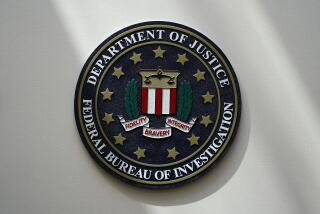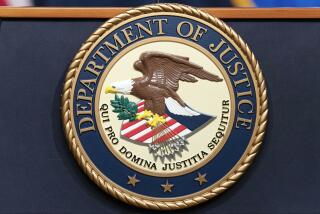In Bombing-Plot Arrests, Not the Usual Suspects
- Share via
AJOUL, West Bank — A mediocre student, a former quarry worker, a youth who cared little for politics or religion but dreamed always of living in the United States, away from the tiny, insular village where he grew up. This is the unlikely picture given by close relatives of Lafi Khalil, one of two West Bank Palestinians wounded early Thursday when anti-terrorist police swarmed into a dilapidated apartment in Brooklyn’s Park Slope neighborhood and found five pipe bombs ready to be detonated.
The FBI believes its predawn raid may have foiled an attempt to blow up a crowded New York City subway station or bus. But a host of questions still surrounded Khalil and the second Palestinian suspect arrested, Gazi Ibrahim Abu Mezer.
Interviews with their relatives and friends--Khalil’s in this placid hilltop village, Abu Mezer’s in the tense divided city of Hebron--gave few clues Friday to why they would have been involved in a terrorist plot against a society that, according to their families at least, the two professed to admire and love.
Any alleged links to Hamas or other terrorist organization were hotly denied by relatives and could not be confirmed from Israeli or Palestinian sources Friday.
Gidon Ezra, a former No. 2 official in the Israeli secret service agency Shin Bet, said of the suspects: “They are not important names that I would remember.”
Judging from their homes, both families of these men are better off than the average Palestinian. And there was nothing in their relatives’ comments or dress that marked them as extreme in their Muslim religion or as rabidly anti-Israeli.
But both families were vague when asked about their relative’s day-to-day activities in the United States, their friends and what exactly the two men were doing overseas.
Speaking in an airy, spacious house that overlooks picturesque hills and ancient olive groves, Souhil Khalil said he could not understand how the 22-year-old nephew whom he described as shy, simple and apolitical came to be found in an apartment filled with bombs and bomb-making equipment. His nephew Khalil had no political affiliation, he insisted. Khalil’s young cousins giggled and agreed that Khalil never prayed, fasted or went to mosque.
According to his uncle, Khalil finished high school with only average grades but then found a job working in a quarry. But he did not like living in the rural West Bank.
“His sole dream was to go to the States and accomplish something as Lafi,” his uncle said. “He was really indifferent about politics in general. He didn’t pay attention to that stuff.”
He said Khalil got a tourist visa to Mexico last November with a return flight through New York. From John F. Kennedy International Airport, he sneaked into the United States. He would call home about once a month. According to his uncle, he found people that he knew in Brooklyn, then went to Los Angeles before returning again to Brooklyn.
*
At first he seemed lost and lonely. Then, in their last conversation less than three weeks ago, Khalil reported to his uncle that things were looking up: He had found some “good people” to live with, and they had jobs. He was working at a supermarket, he said.
Relatives of Abu Mezer, 23, were also unanimous Friday in expressing shock and bewilderment at the arrest of Abu Mezer, “the kid of the family.” They said he used to amuse his six older brothers and sisters with his passion for pet birds. While a teenager, he had hung a dozen or so cages in their living room, said his brother, pointing to the nails that were still there.
The family’s old, high-ceilinged house filled Friday with concerned relatives eager for some scrap of news about Abu Mezer.
Abu Mezer’s father, a retired car-parts merchant, wailed and collapsed when a news report about his son appeared on television.
Abu Mezer’s older brother Nour is a lawyer specializing in taxes who works part time for Yasser Arafat’s Palestinian Authority. As a teenager, Nour said, he himself was arrested and imprisoned for nine months by Israeli authorities for publishing an illegal student paper. At that time, he said, he was falsely accused of being a member of the Popular Front for the Liberation of Palestine, a radical Palestinian splinter group.
But Nour denied that his brother had any similar political dossier. Like many Palestinian youths, Abu Mezerhad been arrested for throwing stones and bottles during the Palestinian uprising against the Israeli occupation. But there was never anything more serious, Nour said. In general, Abu Mezer supported the Oslo peace accords between the Palestinians and Israel and the policies of Palestinian Authority President Yasser Arafat, he said.
He said Abu Mezer was smart, got good grades and wanted to study business administration. He went to Canada about four years ago and entered the United States a year later, inspired in part by his brother-in-law, who had lived and studied in the United States.
When he first talked to him a week ago, Nour said, Abu Mezer was in Florida and talking about making a trip home in September. According to Nour, he asked what the family’s reaction would be if he brought back an American girlfriend, a Christian.
Abu Mezer “doesn’t have an extremist mind, or extremist thoughts even,” insisted the older brother. “He always told us about American democracy and how good life was there. . . . There is no way he would ever thinking of harming these people.”
More to Read
Sign up for Essential California
The most important California stories and recommendations in your inbox every morning.
You may occasionally receive promotional content from the Los Angeles Times.










